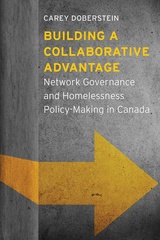
Over 235,000 people couch-surf, stay in emergency shelters, or live on the street in Canada every year. But lack of housing security is just one barrier faced by people who are homeless,
As A Complex Exile shows, the homelessness sector inadvertently reinforces social exclusion as well. The very policies, practices, and funding models that exist to house the homeless, promote social inclusion, and provide mental health care form a homelessness industrial complex. These practices emphasize personal responsibility and individualized responses that ultimately serve to subtly exclude people on the street, which has profoundly negative effects among people experiencing homelessness. Erin Dej explores how a shift from managing to preventing and ending homelessness has taken shape over the past two decades. However, this movement has resulted in an increased focus on individualized responses to homelessness – individuals are charged with "fixing" themselves in order to secure housing and re-enter mainstream society. This book demonstrates that the causes of, and responses to, homelessness have become largely medicalized, limiting discussion on structural and systemic drivers such as income inequality, discrimination, and housing affordability.
A Complex Exile goes beyond bio-medical and psychological perspectives on homelessness, mental illness, and addiction to call for a socially transformed response to homelessness in Canada.
In addition to scholars of sociology, social work, psychology, law, and gender studies, this work will find an audience among homelessness policy makers, service providers, and social justice advocates.
Erin Dej's essential work of non-fiction makes the connection clear between Canada's failed response to the homelessness epidemic and its role in perpetuating social exclusion.
Dej...offer[s] three key truths that the homelessness sector and anyone interested in the field would benefit from hearing.
A Complex Exile is poised to shift Canada’s approach to addressing homelessness. This book highlights the importance of permanently changing the ways in which we react to homelessness: away from solely treating the individual and toward addressing the systemic barriers that create exclusion and deepen poverty.
1 Exploring Exclusion among People Experiencing Homelessness
2 The Pillars of Exclusion: Homelessness, Mental Illness, and Criminalization in Canada
3 Managing in Place: The Shelter as Neoliberal Total Institution
4 Identity Management: Identity Making in the Context of Marginalization
5 Taking the Blame: Responsibilizing Homelessness
6 The Homeless Mental Health Consumer: Managing Exclusion through Redeemability
7 Moving toward Inclusion
Notes; References; Index











